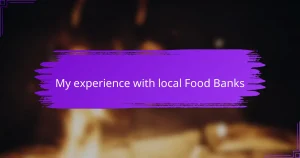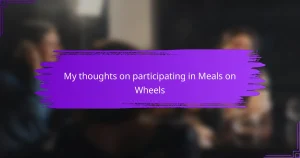Key takeaways
- Community clean-ups foster pride and deeper connections among residents, transforming neighborhoods both physically and emotionally.
- Organizing these events strengthens community values and promotes collective action, aligning with shared ideals for social change.
- Effective planning, clear communication, and leveraging local support are crucial for successful clean-up initiatives.
- Post-event reflection is essential for recognizing successes and identifying areas for improvement for future efforts.
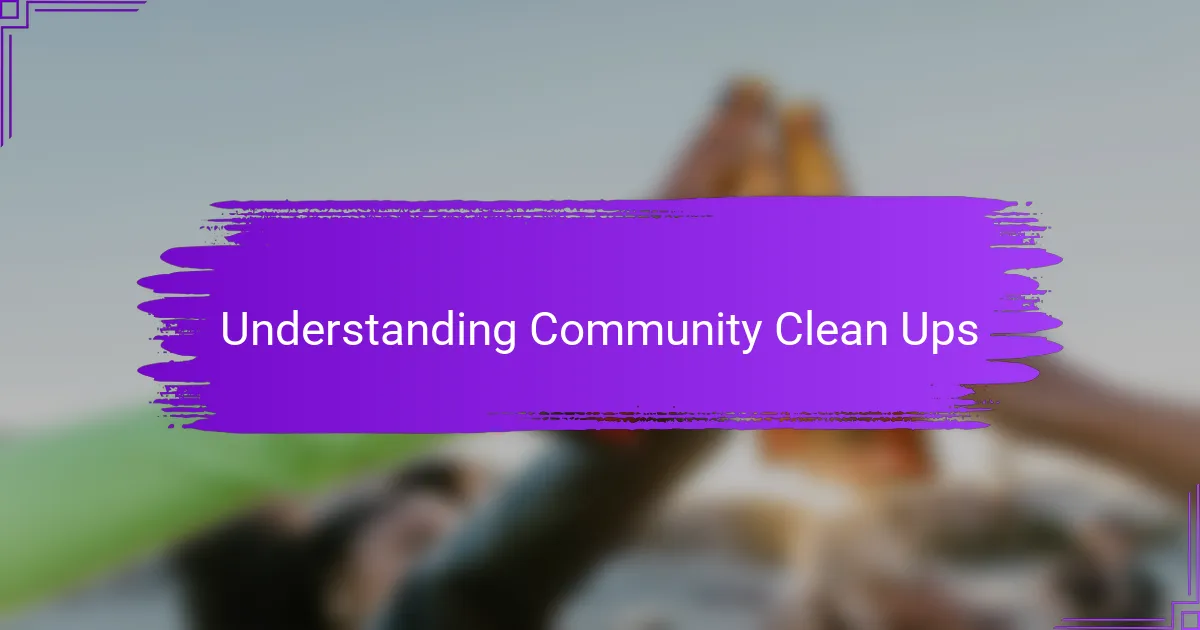
Understanding community clean-ups
Community clean-ups are more than just picking up trash; they are acts of reclaiming our shared spaces. I’ve found that when people come together with a common purpose, a neighborhood transforms—not just physically but emotionally, too. Have you ever noticed how a clean park suddenly feels welcoming, inviting conversations and smiles?
For me, understanding the impact of these events means recognizing the ripple effect. It’s about the pride that swells when neighbors see their efforts reflected in cleaner streets and greener spaces. That sense of accomplishment goes beyond what’s visible—it’s about fostering a deeper connection among community members.
Sometimes, I ask myself why we don’t organize these gatherings more often. The truth is, community clean-ups offer a simple, hands-on way to express care and solidarity. They remind us that change starts with us, right here, where we live.
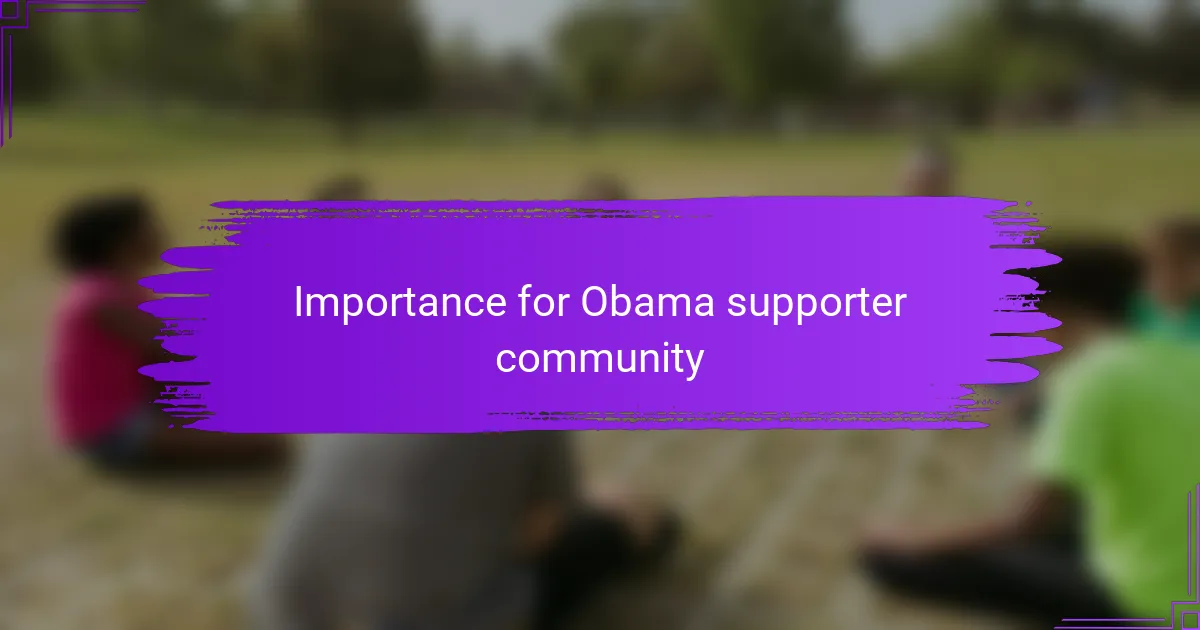
Importance for Obama supporter community
For the Obama supporter community, organizing a clean-up goes beyond just tidying streets—it’s a way to live out the values we believe in, like hope and collective action. When I see neighbors, many of whom share our vision for a better future, working side by side, it sparks a deep sense of unity that words alone can’t capture. Don’t you think that working together on something tangible strengthens our commitment to the ideals we champion?
I remember one clean-up event where someone told me, “This feels like a real demonstration of what we’ve been talking about all these years.” That moment stuck with me. It showed me that acts of community care are powerful extensions of political support—they build trust and inspire ongoing engagement. Isn’t that the kind of change that resonates both locally and nationally?
Moreover, these gatherings remind me why our community matters: it’s not only about supporting policies but embodying those principles every day. The pride we share in transforming our neighborhood reflects the hope that fueled the Obama movement—proving that lasting change begins with us, where we live and interact. How often do we get to see our values in action this clearly?
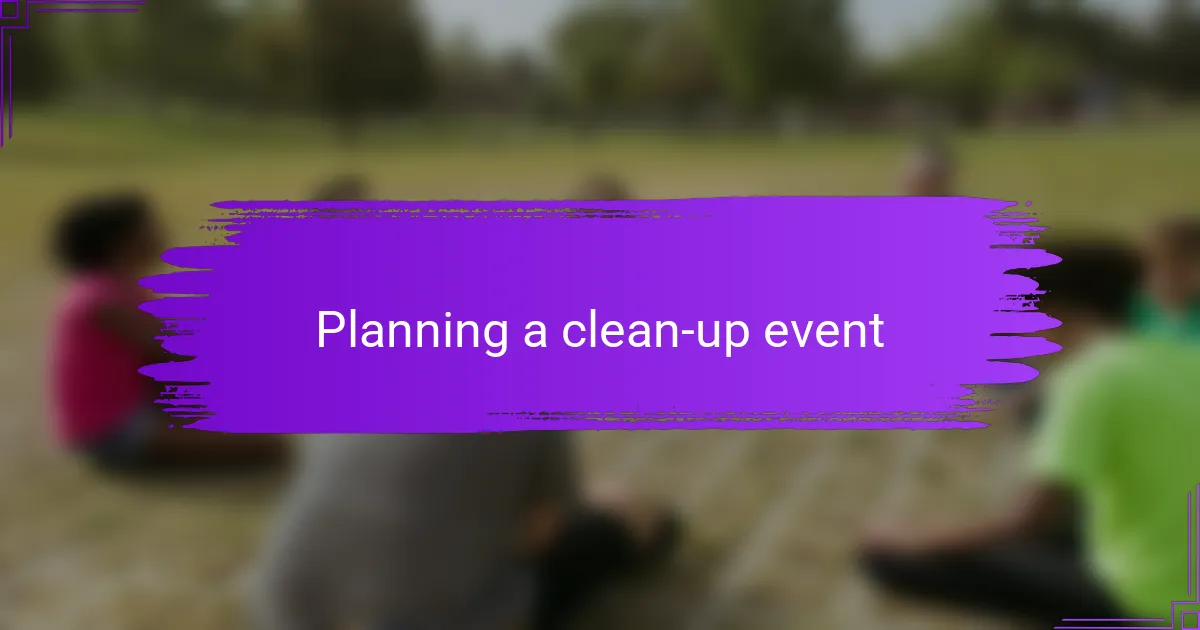
Planning a clean-up event
When I started planning our clean-up event, the first thing I did was map out the area that needed attention. It’s amazing how breaking down the neighborhood into manageable zones made the task feel less overwhelming. Have you ever tried tackling a big project all at once? That’s why setting clear boundaries helped me gather focused teams and keep everyone motivated.
I also made sure to reach out early to community leaders and local businesses for support. From my experience, their involvement not only boosts resources but also shows everyone that this effort has widespread backing. Don’t you find it’s easier to rally people when they see trusted faces endorsing the cause?
Choosing a date was another key step. I learned that picking a weekend when most people are free—while avoiding major local events—makes a huge difference in turnout. Plus, I always like to have a backup plan for bad weather, because nothing kills momentum faster than unexpected rain. What’s your approach to scheduling important community events?
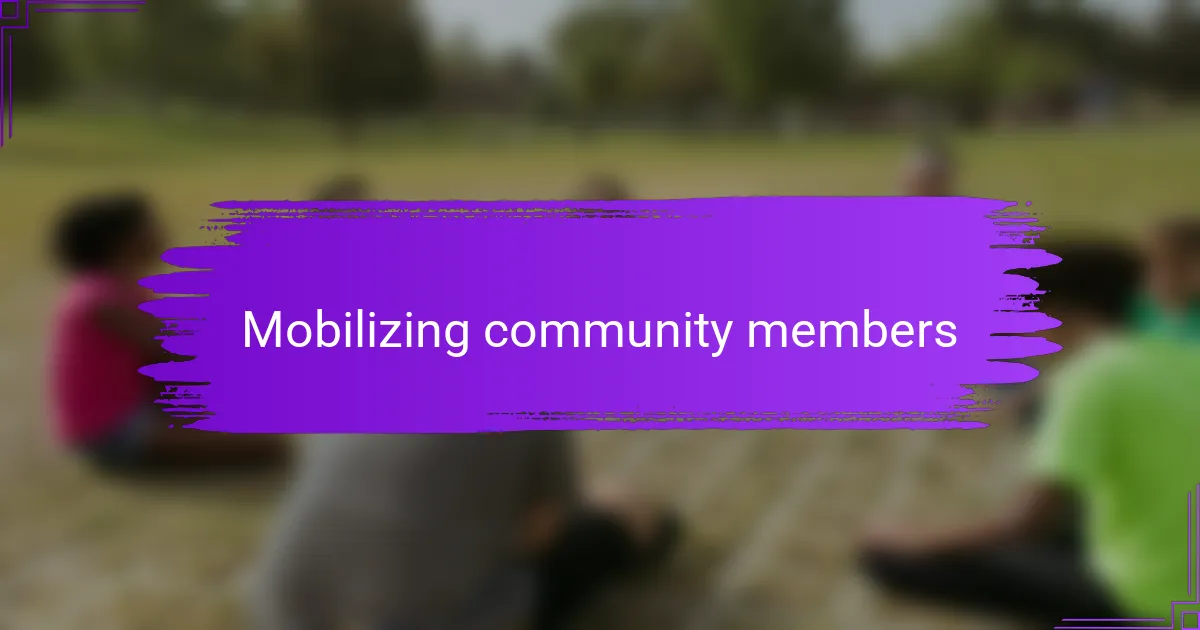
Mobilizing community members
Getting people to show up can be the hardest part, right? I found that starting with familiar faces—neighbors I already knew or had chatted with at local meetings—made all the difference. When you invite someone personally, it feels less like an obligation and more like joining friends in a meaningful cause.
I also learned that clear, simple messages work wonders. Instead of overwhelming folks with details, I focused on why the clean-up mattered: it was our chance to reclaim public spaces together. Have you noticed how a straightforward call to action often sparks more enthusiasm than lengthy explanations?
Finally, leveraging social media within our Obama supporter network was a game-changer. Sharing photos of past clean-ups and personal stories helped build excitement and created a sense of momentum. Seeing others’ commitment fueled my own—and I bet it did the same for many in our community. How do you keep the energy alive before a big event?
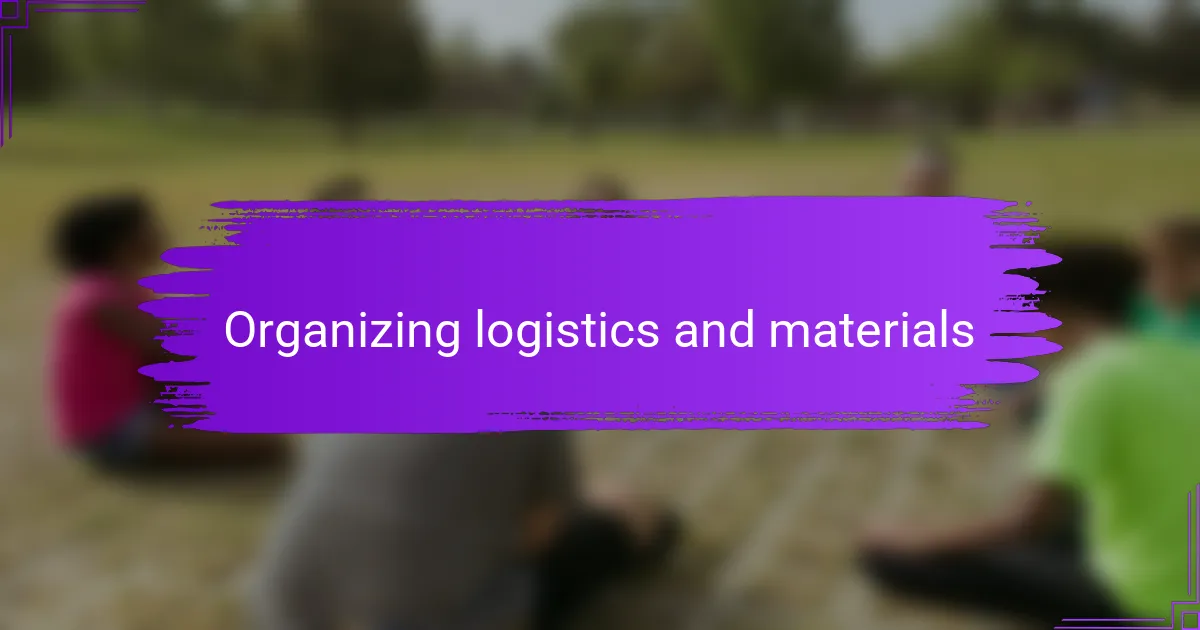
Organizing logistics and materials
Gathering the right materials early on made a huge difference in the flow of the clean-up. I remembered how frustrating it was at one event when we ran out of gloves and had to pause, so this time I created a checklist—trash bags, gloves, hand sanitizer, and even sunscreen. Have you ever been caught off guard because something essential was missing? That small prep step saved us from unnecessary delays.
Coordinating logistics meant thinking about where and how to set up supply stations. I chose a few central spots easy for everyone to access, making it simple to grab supplies or drop off collected trash. From my experience, having these organized hubs kept the energy up and prevented confusion during the event.
Transport also needed attention. I arranged for a couple of volunteers with trucks to help haul bags to the nearest disposal sites, remembering how much heavier everything feels when you have to carry it yourself. It made me realize how important teamwork is—not just picking up litter, but also managing the behind-the-scenes tasks thoughtfully. How often do we overlook the small things that keep big efforts running smoothly?
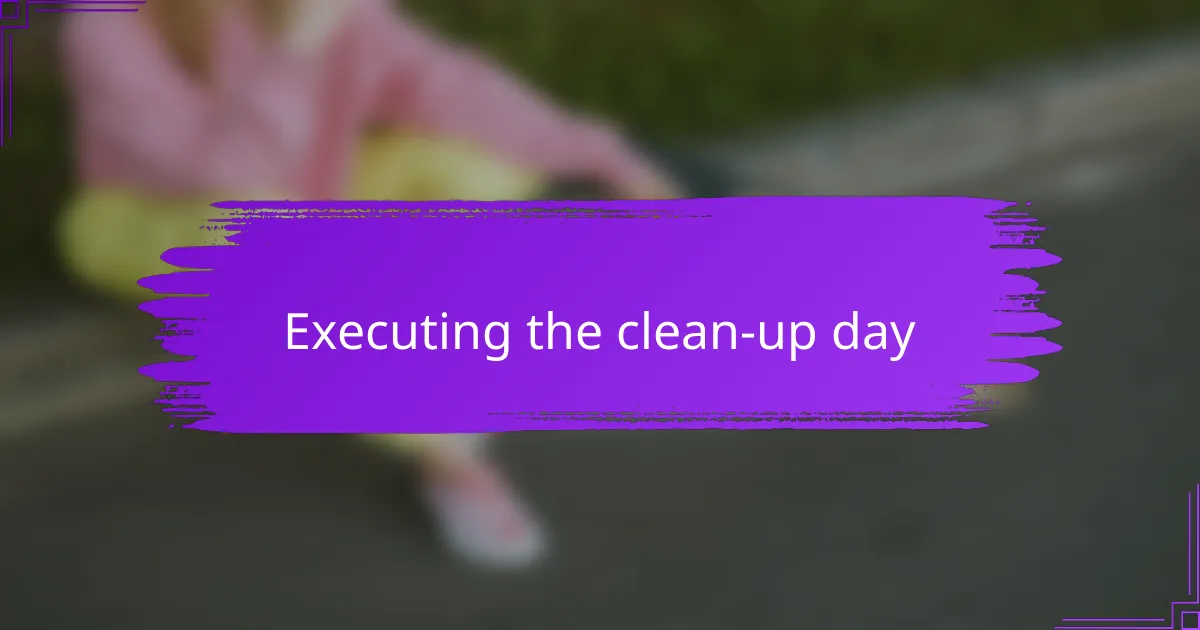
Executing the clean-up day
Executing the clean-up day felt like stepping into a well-choreographed dance. Everyone arrived energized, armed with supplies, and ready to transform our neighborhood. I remember pausing for a moment, looking around, and feeling this overwhelming sense of pride—here we were, turning our shared space into something better, together.
As the morning unfolded, I made sure to check in with different teams, reminding myself how vital it is to keep spirits high. When someone picked up that last stubborn piece of trash or helped a neighbor struggling with a heavy bag, it wasn’t just about cleanliness—it was about community in motion. Have you ever noticed how small acts like these can light up a whole event?
By afternoon, the area was visibly cleaner, and the smiles were even bigger. Wrapping up, I gathered everyone for a quick debrief and a moment to celebrate. Hearing stories from first-timers and longtime volunteers alike reminded me why these days matter so much. Isn’t it amazing how a few hours of effort can build connections that last far beyond the clean-up?
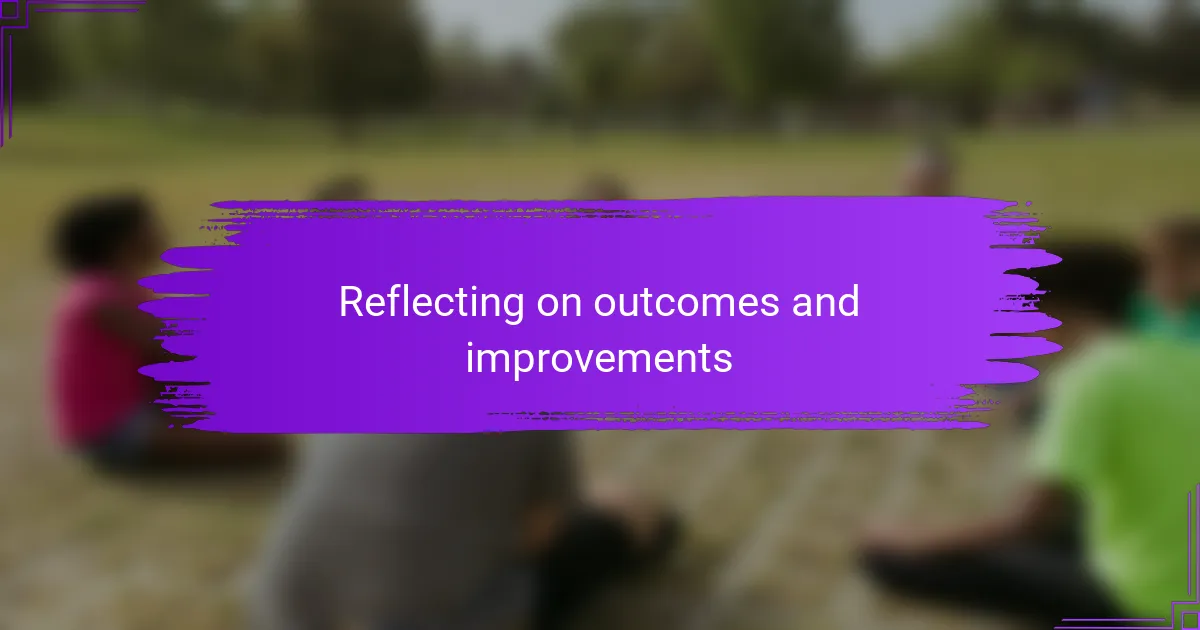
Reflecting on outcomes and improvements
Looking back on our clean-up, I felt a surge of pride seeing how much we accomplished together. Yet, I couldn’t help but think about the small hiccups—the moments when supplies ran low or some areas didn’t get the attention they needed. Have you ever reflected on an event and wondered how even small tweaks could make a big difference next time?
From my experience, those little missteps are valuable lessons. For instance, I realized that clearer team roles and better communication upfront would have kept things running smoother throughout the day. Don’t you think that having a quick check-in system during the event might help catch issues before they grow?
Most importantly, reflecting on outcomes isn’t just about what went wrong—it’s about celebrating what went right and building on that momentum. I’m already thinking about ways to deepen community involvement and make future clean-ups even more impactful. What improvements would you suggest if you were leading the next one?

